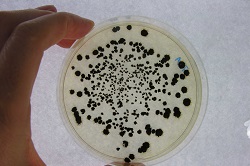Biopesticides replace toxic chemical sprays
Consumer concern about chemical pesticide residues on food has created a market for safer, environmentally-friendly pesticides. Four environmentally-friendly bio-based pesticides were developed under an EU-funded collaboration between scientific researchers and pesticide companies. Two are already being sold in Europe. The INNOVA (Innovative bio-based pesticides to minimise chemical residue risk on food) project brought together academic researchers and commercial pesticide companies to identify and develop bio-based pesticides. A literature review was conducted at the start of the four-year project and some 100 biopesticide candidates were identified. Preliminary tests and small-scale trials were conducted on some two dozen of these before identifying those with the largest potential market – for example, grapevines account for a large portion of pesticide use within Europe - almost two-thirds of all fungicides applied to crops. INNOVA’s work led to the active substance Trichoderma atroviride SC1, which is based on a microorganism, being registered for use in Europe. It is currently sold as a fungicide in Germany and France for use on grapes, and in the near future also on tomatoes and strawberries. ‘When you apply this microorganism to the plant it immediately colonises the wood and forms a biological barrier (against the pathogen),’ says project coordinator Dr Ilaria Pertot, senior researcher and head of the department of sustainability at Fondazione Edmund Mach(opens in new window) in Trentino, Italy. It is stable and persistent so ‘one treatment lasts the entire season,’ she says. ‘The compound used in the past was sodium arsenite - a very toxic fungicide that has been banned.’ Bio-weedkiller Another product developed under the project is pelargonic acid, a fatty acid derived from oils or animal fats which dissolves the protective wax on leaves, making it a natural herbicide. It has the potential to replace the widely-used weedkiller glyphosate, a powerful chemical desiccant. ‘It needs reapplication and it is not as strong as glyphosate but this natural compound can be an alternative,’ Dr Pertot says. Two more biopesticides currently going through the EU registration process will be on the market within 2 to 3 years – a plant extract that interferes with the digestion of specific insects without harming humans or animals; and a compound absorbed by certain pathogens but with no nutritional value for them, so they become inactive and die. The key to developing these biopesticides was the collaborative working relationship between academic researchers and pesticide companies, enabled by a Marie Curie grant, Dr Pertot says. She adds that scientists are highly specialised and often unaware of the real-world context of their research; while companies are not up to date with the science or have difficulty understanding new scientific concepts. Feasible for the grower Together with pesticide distribution company Belchim and BIPA, a company specialised in biopesticides registration, the team worked to formulate the biopesticides and to tackle storage and distribution issues. ‘Having a good active ingredient does not mean you have a good commercial product,’ say Dr Pertot. ‘We had to see in practice if the product is really applicable and feasible from the perspective of the grower.’ ‘Now we have a box with the strain formulated in the right way, so the grower just dilutes it, puts it in the sprayer and sprays it like a normal pesticide.’







